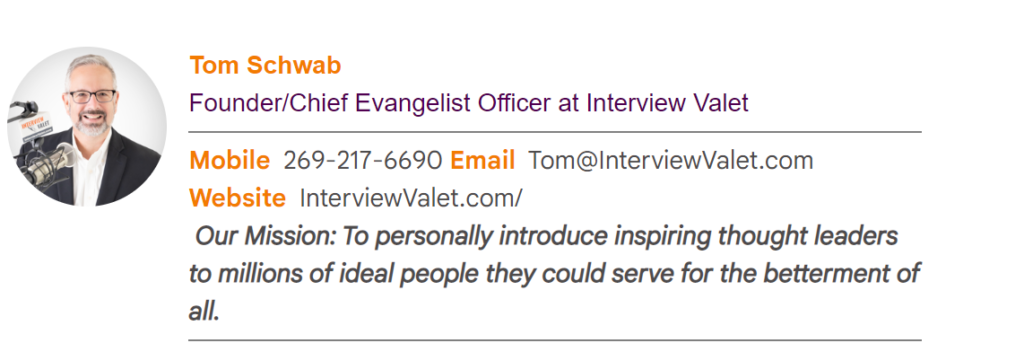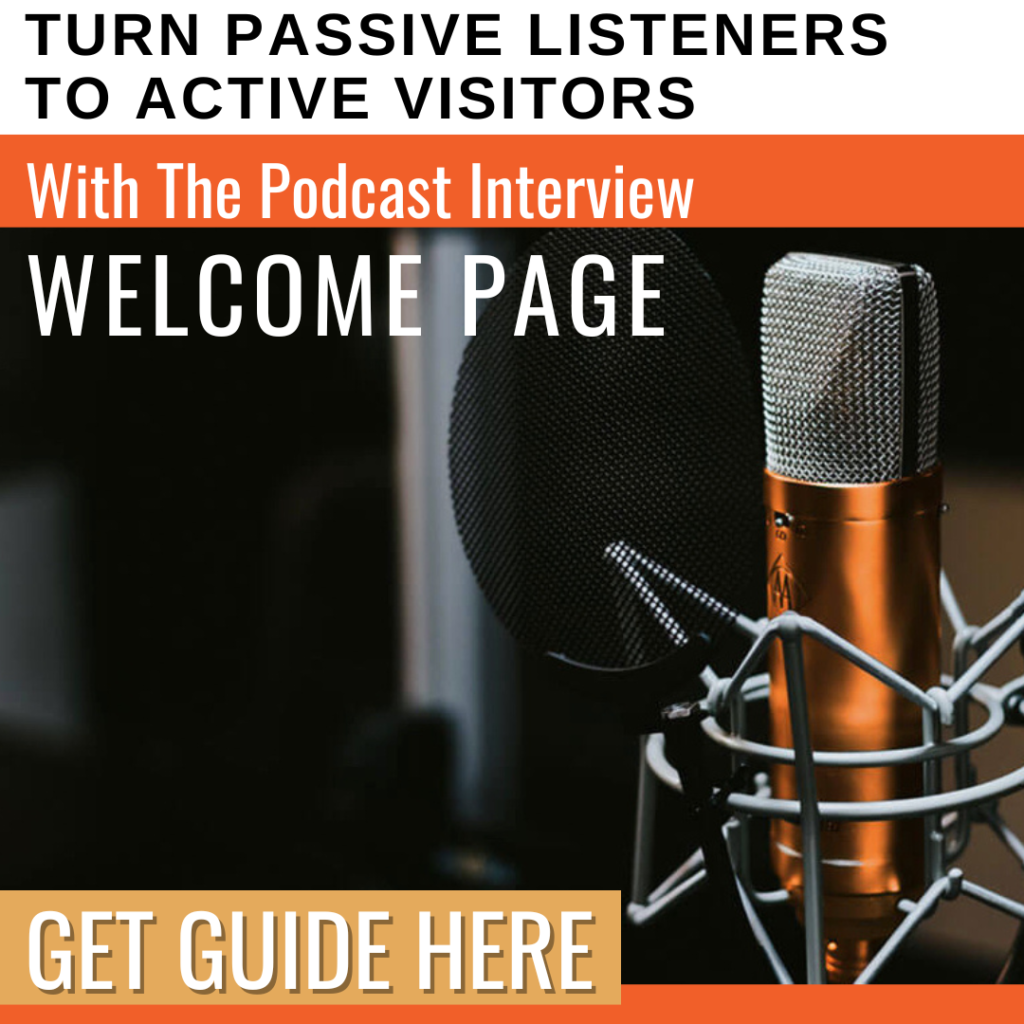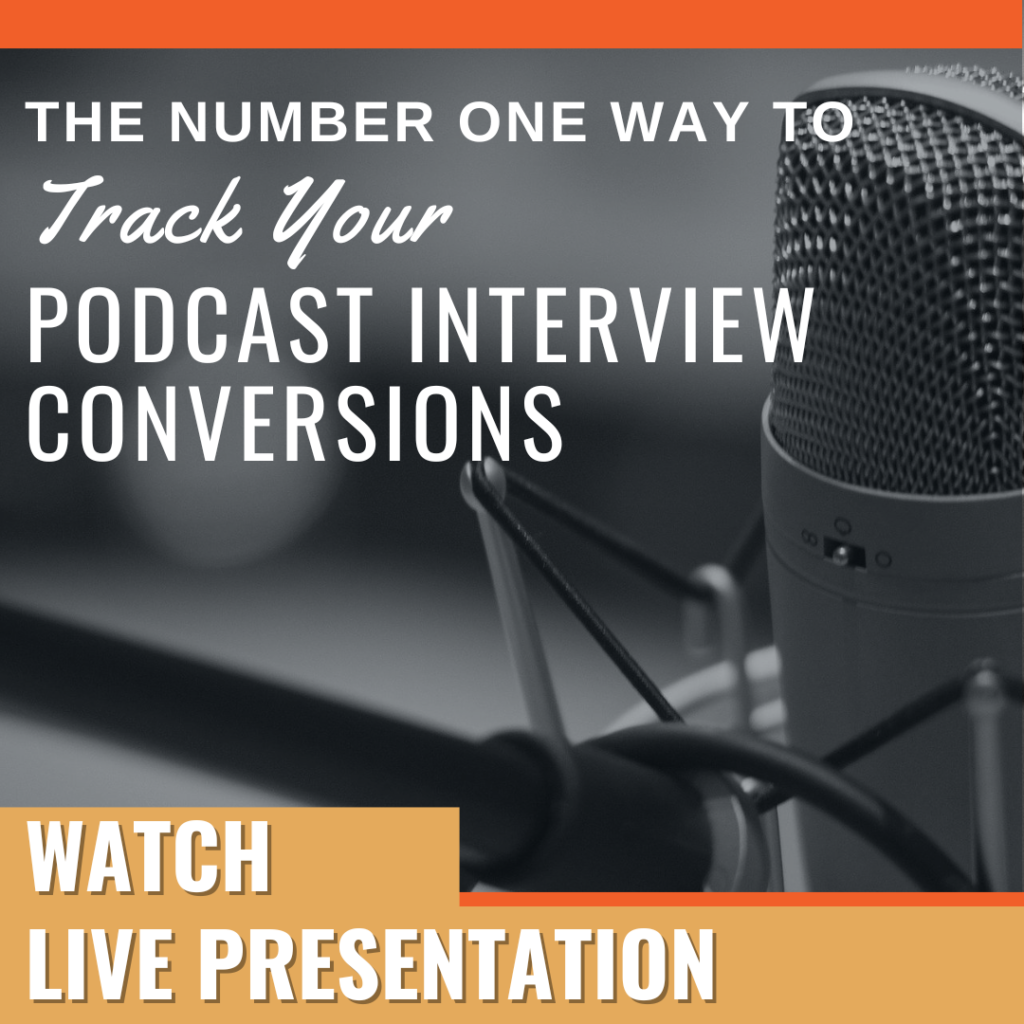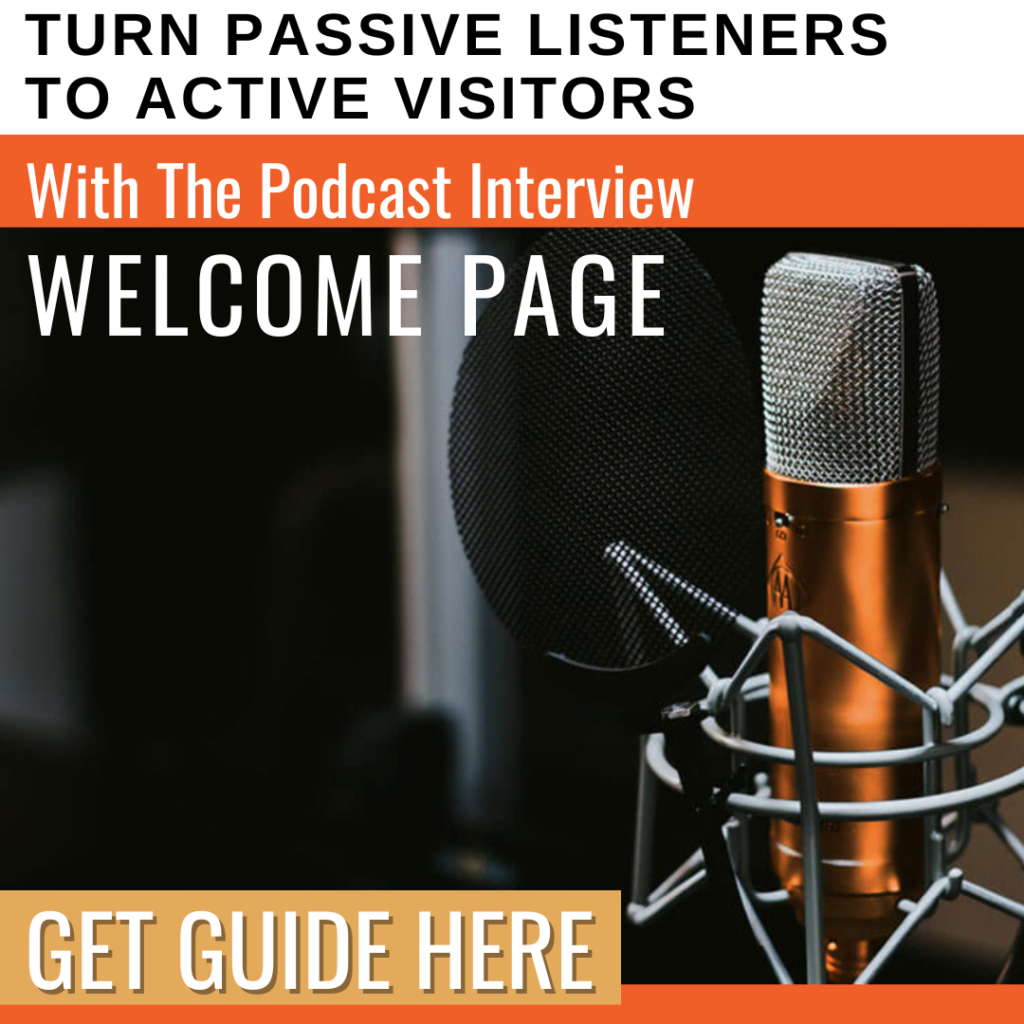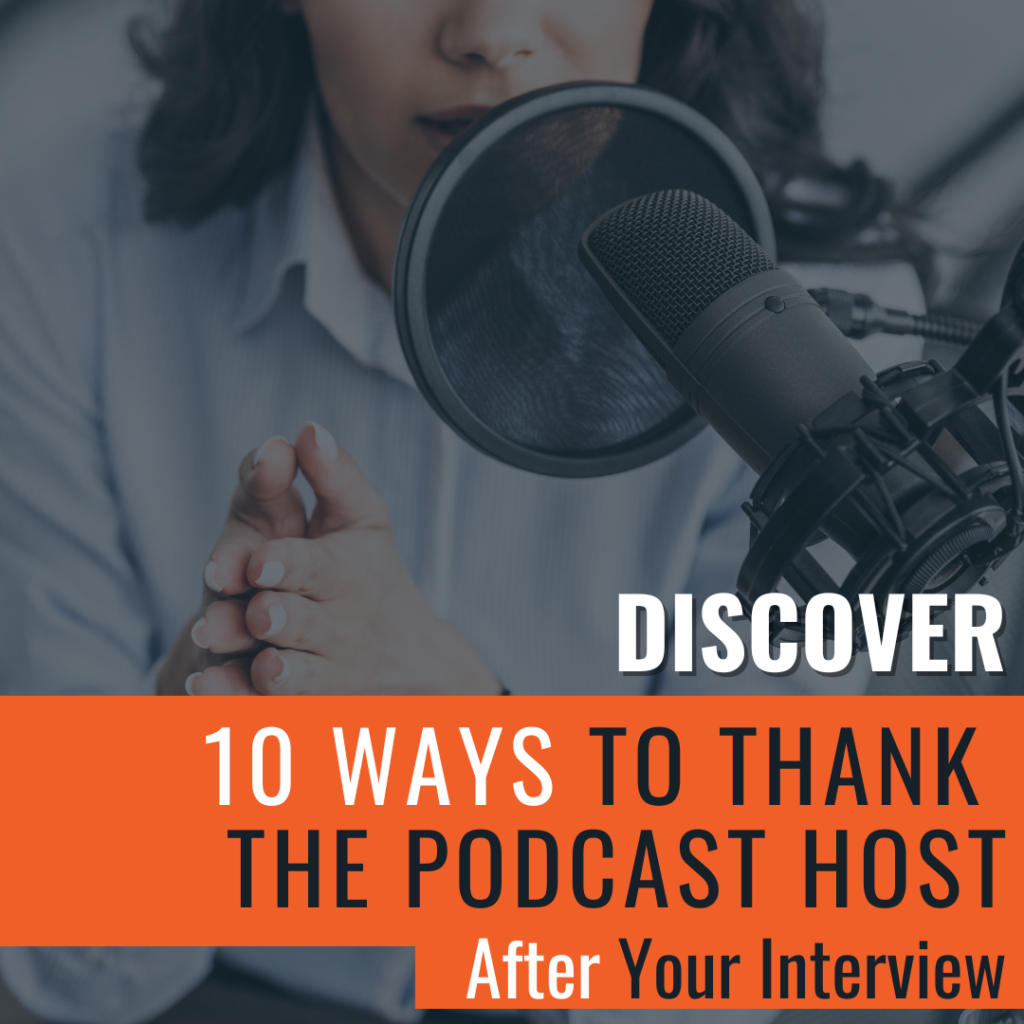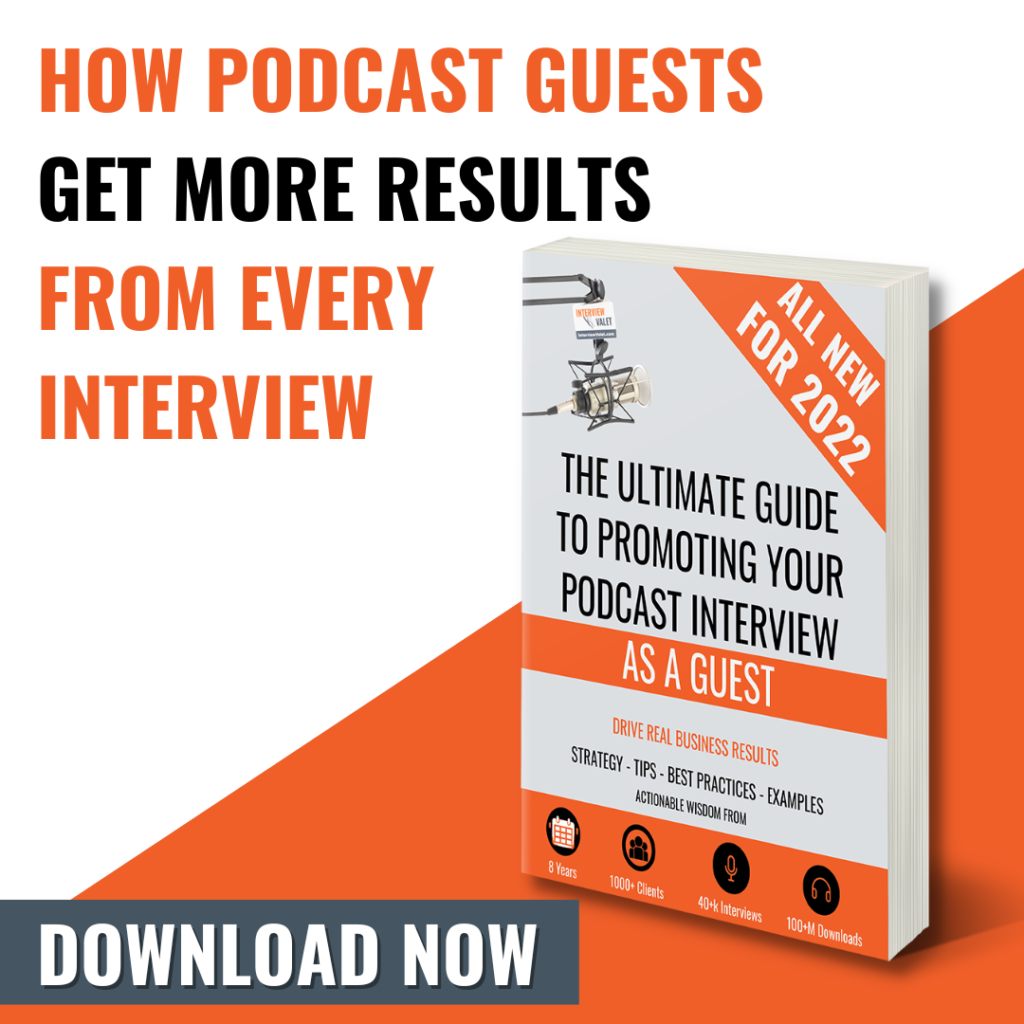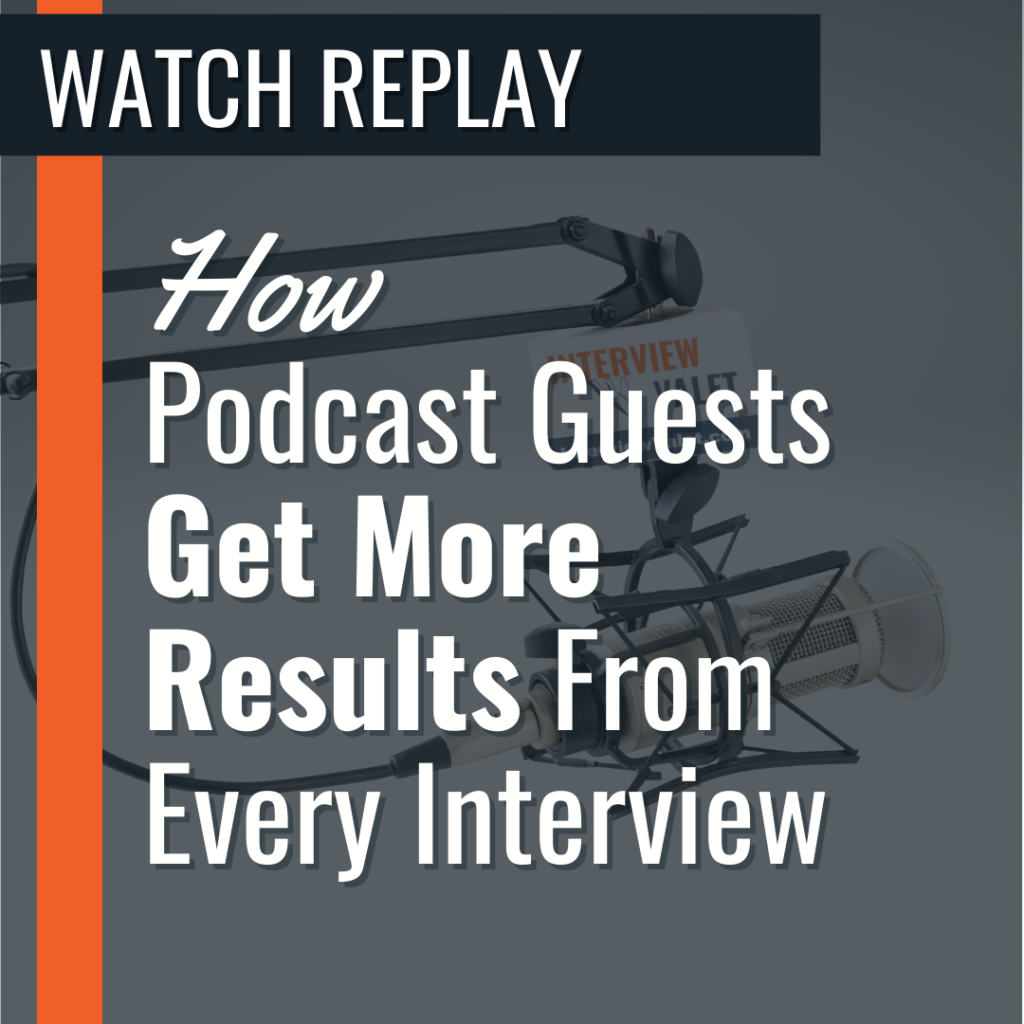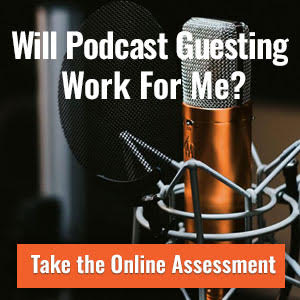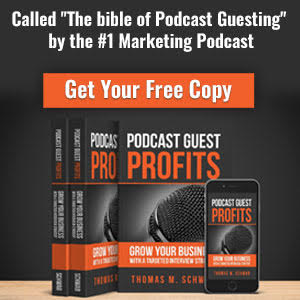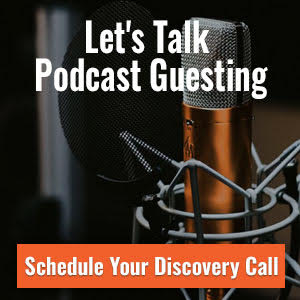
Podcast interviews have proven to be a powerful marketing tool to grow a brand and your business. Leveraging other people’s audiences with podcast guesting can be used to drive sales, lead generation, and business development. Over the last 8 years, we’ve worked with over a thousand nonfiction authors, high-level coaches/consultants, and leading brands to drive results. My observations are based on this data.
Too often I see well-meaning guests on podcasts make fundamental errors that surely compromise their results. After all, their goal is not to get more interviews but to get more results from every interview.
I urge them to improve their process before they invest more resources:
- If you were fishing and didn’t catch anything, would the answer be to do more fishing?
- If you ran Facebook Ads and didn’t see conversions, would you just spend more money?
I’m baffled when I hear guests whose podcasts aren’t converting. They aren’t getting results and think the solution is to do more interviews or to get on bigger shows.
They say the definition of insanity is doing the same thing and expecting different results. In the Navy, we just called it “doubling down on stupid”.
This article is meant to help you identify and fix the one or two issues that is keeping you from turning their listeners into your customers.
Which is why I wanted to share the 10 fundamental mistakes I often see podcast guests make. As you read this, reflect on your interviews to see what you can do to get more from every interview instead of just doing more interviews. More is not better. Better is better.

1| Wrong Audience
A common practice is to start pitching big shows on a list. This could be a list from Chartable, Spotify, or iTunes. It could be a list you find when you Google “best podcasts for coaches”.
Just remember the old adage: You can’t say enough of the right things to the wrong people or the wrong things to the right people.
Data on podcasts is not as rich and detailed as other media like TV, radio, and print. This is partly due to the fragmented ecosystem (there are dozens of major podcast players compared to most videos being played on YouTube). It is also a factor of the nature of RSS feeds (the heart of podcasting), agreements between hosting companies and the podcast hosts do not allow the public sharing of show or episode data. While third-party data has drastically improved, the new iOS update could reverse that.
As a general rule remember, the audience is like the host or aspires to be like the host.
- Younger hosts attract younger audiences.
- Female hosts tend to attract female audiences.
- Ph.D. hosts tend to attract Ph.D. level, or those who aspire to be, audiences.
If the host doesn’t reflect your ideal buyer, chances are the audience won’t either.
A prospective client wanted to target Fortune 500 CEOs. We can, and do, target that audience for clients. He then shared that he wanted to be on “Entrepreneur on Fire”, a great show on the HubSpot Podcast Network that is heard consistently by over 40K people. Popular podcast, large listener base, but not their target customers. EO Fire talks to solopreneurs, side hustles, non-funded startups, and small businesses. Look through the interviews and you’d be hard-pressed to find anything of interest to a Fortune 500 CEO. Appearing here would be as futile for them as fishing in a swimming pool.
Ask Yourself
Are you talking to nice people or nice customers? These two are not mutually exclusive.
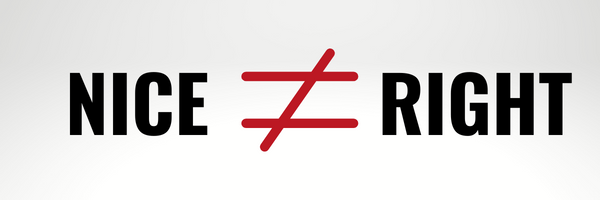
2| Confusing and Losing
Most guests have a wide area of expertise. They are interesting. They can talk about their business, background, travels, relationships, and opinions (we can all talk about our opinions for hours), but how does this support your goals of being on the show?
“Who am I and why am I here” is how Admiral James Stockdale started his Vice Presidential debate. He knew it’s what the audience wanted to know BEFORE they could or would care to connect to his message.
Does everything in your suggested introduction support what you are there for? It may be interesting that you enjoy running, have 4 kids, 2 grandkids, and 2 miniature donkeys. (Which I do.) But if it doesn’t support what you are trying to accomplish, leave it out.
Pro Tip
A great question a guest can ask the host before they hit record that will ensure both are focused and know the direction of the conversation – What are your goals for this episode?
GUEST: I’m excited to be here. I want to bring as much value to you and your audience as possible. What are your goals for this episode? What are you trying to get out of this interview?
Starting with the end in mind, the host will often detail their audience and identify what they are most interested in. Then…..wait for it…..they will most likely ask the guest what their goals are.
If the host doesn’t ask the guest about their goals, your follow up can be, “I will definitely deliver on that [the host’s goals]! Here is what I’m looking to get out of this interview…”
ADHD Theater, as Christopher Lochhead of Follow Your Different Podcast describes it, can be entertaining, but if you aren’t clear on who you are and why you are there, don’t expect the audience to figure it out.
Ask Yourself
Would every listener clearly understand how I can (or cannot) help them? Put yourself in the listener’s shoes.
3| Lack of An Emotional Connection
No one cares how much you know until they know how much you care.
There are two ends of the spectrum when it comes to this fatal flaw.
The first is the person who wants to prove just how smart they are. They focus on impressing the audience with facts and figures. They tout (and often exaggerate) their resume. They seek to impress the audience, but often alienate them instead. They become unrelatable, unmemorable, and uninspiring.
On the other end of the spectrum is the pitch man. The guest who seems to have ABC tattooed on their arm. The conversation turns into an infomercial. Podcast interviews are a great place to gain the know-like-trust trust but an awful place to sell.
As Rand Fishkin said “today the best way to sell something is to not sell anything but to earn the awareness, trust, and attention of those who might buy.”
If you think you might be selling too hard, you are.
The great speech coach Pat Quinn teaches that people connect with you in this order
- Head – he’s smart, he knows his stuff
- Heart – he understands me, he’s like me
- Hands – he’s asking me to do something
- Heart – he’s trying to help me
Pro Tip
Our client Arthur Joseph is the speech coach for countless celebrities and the NFL for decades. Through his Vocal Awareness program he taught me the need to slow down to connect.
The last question on any interview is often “How do people get in touch with you?” or “Do you have any final thoughts?” Often people rush through to get one last plug in fearing that they will be cut off by a mysterious clock. Podcasts are not radio. There is no “news and weather on the 5s”. If people have listened for 30 to 45 minutes, they’re invested. They are enjoying the guest (Head). If not they would have left. Be intentional – Take a deep loving breath, lean into the microphone, drop your voice. Then remind people why you do what you do (Heart), what they can do for the next steps (Hands), and how you believe in them and their future (Heart).
Ask Yourself
Does my closing connect with my ideal customers and easily move them to the next step?
4| Lack of Fresh Engaging Content
Have you done a dozen podcast interviews or have you done one interview on a dozen podcasts?
I’ve often said the best podcasts are like listening to an interesting conversation at a coffee shop. It would be rude to interrupt, but the voyeur in us can’t turn away. Real conversations are compelling. Interviews are boring. Asking the same canned questions and getting the same canned answers is mind numbing. As our client Erik Weihenmayer once said “the world doesn’t need more bullshit.”
Don’t believe me? Would you rather sit in the coffee shop and listen to friends in a heartfelt conversation or listen in as the assistant to the manager interviews a dozen potential busboys?
We generally advise clients:
- Don’t do less than two interviews a month. There is a sweet spot with two interviews. Our clients have told us when they do less, they never get in the swing of it and it feels like a chore.
- Don’t do more than one a week. Make each interview special, focused on a key topic, promote it, and repurpose it.
Remember our company gets paid per podcast and I’m advising you not to do more than one great interview a week. That’s because it isn’t about more interviews, it’s about more results from every interview.
Pro Tip
Jeff Madoff came to us to promote his book CREATIVE CAREERS: Make a Living With Your Ideas. Initially, many hosts turned down the opportunity to interview this amazing man because their podcast wasn’t focused on careers or creatives. Once we broke down each of the dozen chapters it began to gain traction. The myth of the lone creative was applicable to business, entrepreneurship, and leadership. Plus every interview stood alone and could be repurposed. Sure when he was featured on Tim Ferriss, he talked about the book in its entirety, because it made sense for that show.
Ask Yourself
If an ideal client heard you on an interview and started to binge your episodes, would they be bored and stop or be impressed and engage with you?
5| No Compelling Next Steps
Did you ever see the movie Jaws where they start chumming for sharks? They put out the bait and the sharks gather round the boat.
This is how I picture far too many podcast interviews. Great performance. You’ve attracted them, but where is the hook? Sure maybe one will jump in the boat or find you online, but without some good hooks you are frustrating your prospects and yourself.
Notice I said hooks (plural).
Every digital marketer will tell you one call to action. I don’t disagree with them, but our testing has shown that for podcast interviews three calls to action always convert best.
- small yes – something that doesn’t take much time or money. An assessment, checklist, etc…
- Medium Yes – something that builds the relationship. A book, video, course, case study, small purchase.
- HECK YES – They have a credit card in hand and are ready to sign. Let them purchase or schedule a discovery call.
You are talking to a wide range of people at different parts of their journey, you need to meet them where they are. Which is why the three yeses convert the best for this medium. This is not cold traffic from a Facebook Ad, this is hot traffic that has listened to you for 30 to 45 minutes. They have gotten to know you somewhat and they want to know more.
Pro Tip
“Whales don’t click and big fish don’t swim through funnels.” We learned this from Bill Troy on his virtual book tour for CLICK SAND: How Online Marketing Will Destroy Your Business. If you are talking to a high level executive or offering a 6-figure consulting engagement, a $7 trip wire product on a ClickFunnel page will kill every sale. If they come with a credit card in hand wanting to talk with the wizard, let them talk with the wizard.
Ask Yourself
Have you given the passive listener a compelling reason to go to your website?
[HINT: Today, no one wants another newsletter.]
6| Making It Hard To Connect
Donald Miller from Storybrand says “If you confuse, you lose.”
Too often I hear people kill a good interview by answering the last simple question wrong. “So where can people get in touch with you?”
They forget that 70% of people are listening to the podcast episode sped up and they are likely multitasking: Driving, jogging, cooking, working….they do not have a pen and paper in hand to take notes. Still, I hear people give their email, phone, LinkedIn, Facebook, TikTok…..heck I’ve even heard someone give their physical address.
Do you really think people will remember any of it, much less take action?
Our studies from over 8 years show the best place to send them is a dedicated page on your website. We call it a Welcome Page. This is an evergreen page to send evergreen traffic. Evergreen means it retains relevance, it’s not time sensitive and continues to drive traffic long after it’s initially published. A Welcome Page page will not change over time, so even if someone hears your interview years from now they will see what they expect to find. This is unlike your homepage on your main website that hopefully will get updated routinely.
It’s also not a landing page or a squeeze page. Landing pages are missing a key element of the Welcome Page which is they are typically missing the navigation in the header or footer. If someone comes to your Welcome Page after hearing you on an interview, and they want to explore the rest of your website, by all means you want to give them the opportunity.
Sending traffic to a dedicated Welcome Page also allows you to attribute the traffic so you know exactly what came for each appearance. Making it great for ROI tracking.
Making a Welcome Page is relatively easy. You create the template one and duplicate it for each interview, making only a few minor changes:
- Host name
- Pronouns
- Podcast art
- Slug
Also make sure you tell the search engines NOT to index these pages. You don’t want to get traffic from any other source. The only way someone will find this page is by hearing your interview.
7| Transaction or Relationship?
As a guest, you (or your agency) have worked hard to get you in front of an ideal audience. If you find that audience valuable, why wouldn’t you want a relationship with the leader of that community?
Too often I see guests appear on a podcast, then treat it like an awkward one night stand. They never thank the host, engage with the community, or nurture the relationship.
If it was important for you to access this audience once, it should be important to stay in front of them. A little effort goes a long way. Send a physical thank you note or at least one via email. When the host posts the episode make sure to comment and engage with the audience. Some savvy guests will even run paid advertising to the group for the first month knowing that 80% of the listens come within the first 30 days.
Pro Tip
A client came to us wanting to do a podcast interview campaign for a new product just like she had a couple of years back. In our due diligence, we reached out to some of the podcast hosts who had interviewed her. All said they would NEVER invite her back. She had completely ghosted the shows after her last round of interviews. Her actions destroyed important relationships.
Plus, your reputation can, and likely will, follow you. There are more than two millions podcasts right now but it’s still a small community. Podcasters talk with other podcasters. Which meant leveraging podcasts for her product launch was no longer a viable marketing strategy.
Ask Yourself
If I reached out to a podcast host a year after the interview would they remember me?
8| Not Promoting The Interviews
If a tree falls in the forest and know one is there to hear it does it make a sound?
If you are on a podcast and no one knows about it, does it make a difference?
Promotion is not just the responsibility of the host. It is a two-way street. Both parties should be committed to collaborative promotion. In fact, this is one of the biggest complaints we get from podcast hosts. Going back to that feeling of being ghosted. Podcast hosts invest a lot of time and money into their shows. They work hard to gain and retain their listeners. When a guest comes on their show to leverage that audience but do nothing to reciprocate the promotion it leads to feeling used and abused. At a minimum, it isn’t difficult and doesn’t take much time at all to repost and share posts from the hosts.
This is YOUR interview so take the time to craft social media posts, mention it in your email blasts, put it on your website. Doing so will only benefit you and optimize your time investment.
Pro Tip
As a guest ask if you can record the interview for a backup copy. The host will appreciate the professionalism. Plus this will also allow you and your team to start crafting social media posts, blogs, videos, etc. and be ready when the interview goes live.
Ask Yourself
Does my community know about every podcast I’m featured on? If not, is it because I’m not promoting it or that I’m not proud of every interview?
9| Not Making The Most Of Every Interview
Podcast interviews are rich with compelling content. Studies from Edison Research report that 51% or the adult US population listens to podcasts. So what about the other 49%?
Today it’s easy to create in the way that is easy for you while almost making the most sense to your ideal clients. Remember, it’s about meeting them where they are. You want to provide your target audience with content in the way they prefer to consume and is easy for them to share.
Podcast interviews can be turned into blogs, articles, videos, social media posts, and sizzle reels. There are online tools, agencies, and even freelancers that can repurpose your new and existing interviews.
As a guest myself, the best part of this for me has been that it doesn’t take any more of my time. It can be systemized and delegated.
Take a little bit of time to map out a plan. How can you promote your interviews in a way that makes the most sense for your business and your audience? What is your plan of action around for promotion each interview? Who will create these pieces? You only need to create this system once. It will make each interview you do going forward easy because you have a system in place to effectively distribute it. You aren’t recreating the wheel each time.
Ask Yourself
Am I getting a month’s worth of content for every interview?
10| Are Your Decisions Based on Feelings or Data?
At Interview Valet we are proud to be a human-centered company that makes decisions based on data.
How do you know if your interviews are working? If you can’t attribute the traffic, leads, and clients you can not make data backed decisions.
There are three major ways we’ve seen to better attribute traffic and results from podcast interviews:
- Welcome Pages for each interview are the only way we’ve found to positively and automatically attribute traffic.
- Asking on forms is a classic approach that serves its purpose well. “Where did you find out about us?”
- Asking in sales conversations. Often people won’t know the exact podcast or the first touch point but they will remember the most important one.
Pro Tip
Rand Fishkin, the Founder of MOZ tells the story.
Someone heard him on a podcast.
They put his name into Google and arrived at his website.
Google claims all the credit.
Now the visitor gets distracted and leaves before completing a purchase.
Thanks to retargeting, Facebook gets them back to the site to make the sale.
Facebook claims all the credit.
Was it Google, Facebook, or the podcast interview that drove the sale?
In reality it was an entire marketing system, but because traffic from the podcast interview lacks data it will rarely get any credit.
Conclusion
If you read all of this, thank you. But sorry, your life will not change. Your results won’t improve just by reading this article. You’re more informed maybe, but not changed.
Knowledge is not power, it is the potential for power.
The biggest lie I’ve ever heard is on my ring from the US Naval Academy: Ex Scientia Tridens – From knowledge, seapower.
The smartest Navy doesn’t rule the sea. Just like the smartest business doesn’t get the sale.
It’s the one that learns AND applies.
My challenge to you:
- Grade yourself on all areas that could be stopping you from moving people from being passive listeners to active visitors to engaged leads.
- Next, put in some type of system to track your results. Without it you will have no gauge if the changes are helping or hurting your business.
- Now start working on the lowest score first as you have the biggest opportunity for improvement.
Continue to perfect your conversations and your conversions.
Once you are getting consistent results that provide an acceptable ROI of your time and money, then crank up your activity. Do more podcasts, talk to larger audiences, invest more in podcast guesting.
You can take an online assessment here and have a free no obligation conversation with our team. Here you can gain from our experience of over 8 years helping 1000+ people like you get on over 50,000 interviews.
Stay strong, the world needs to hear you now more than ever.
Tom
